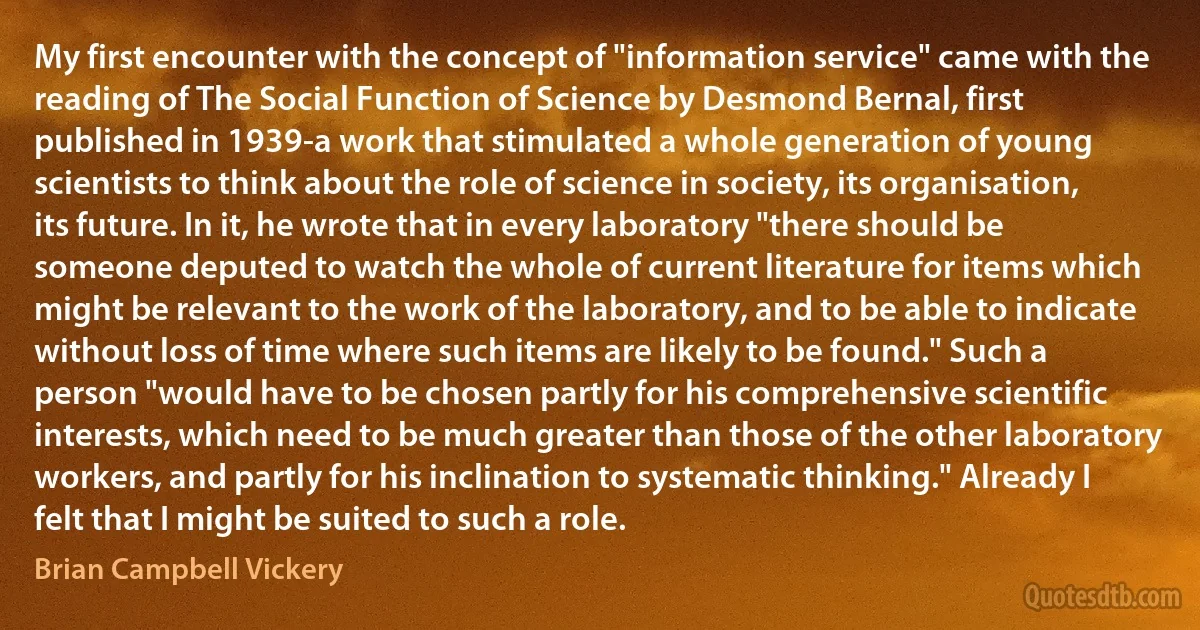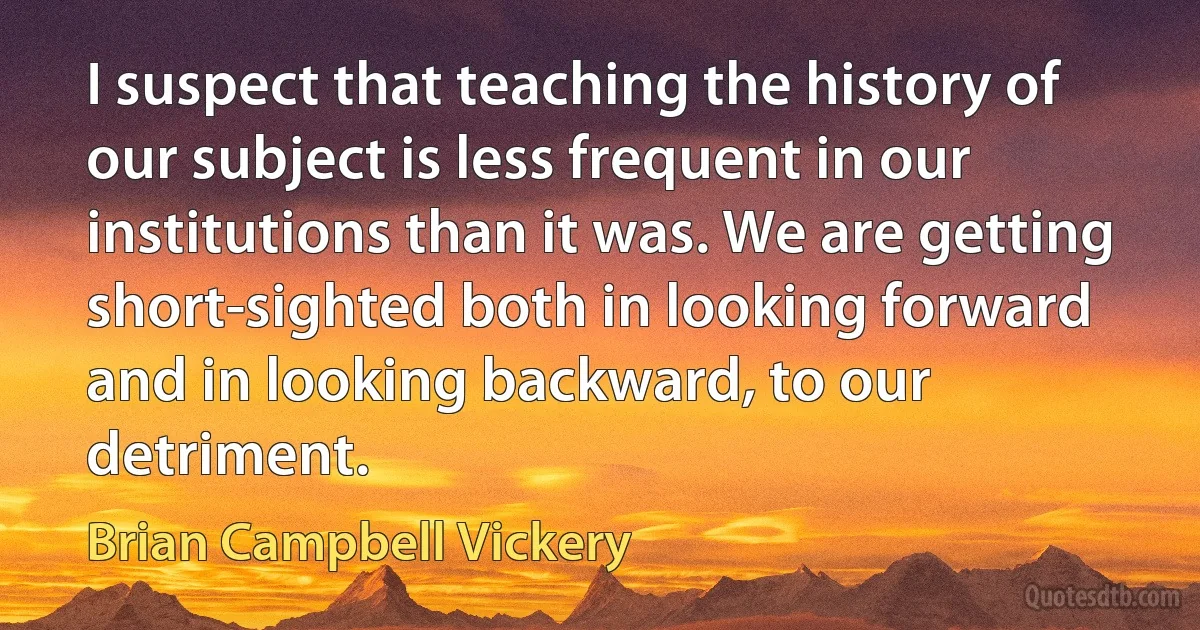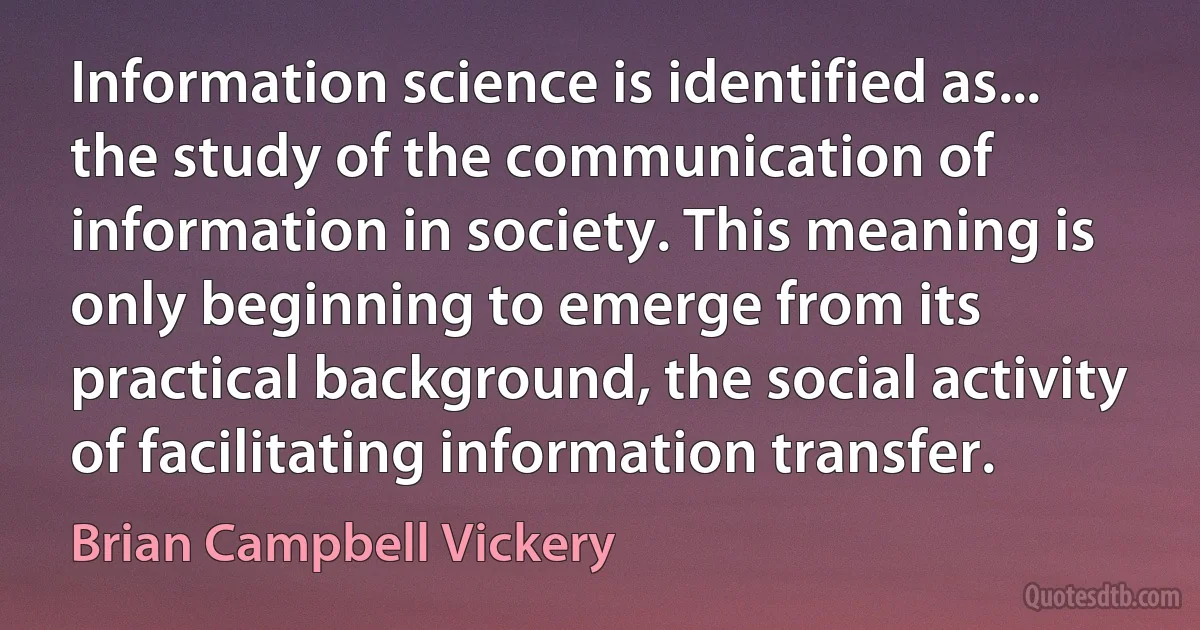Brian Campbell Vickery quotes - page 2
I am always surprised that the information profession, so quick to sing the virtues of literature search for its customers, pays so little attention to its own history. I have been told: "our problems are different from those of the past”. It is not so the problems are often the same, only the technical means available for solution may be new. The thinking and experience of the past can often shed light on the present.

Brian Campbell Vickery
In science there are uses many classifications of entities - plants, animals, rocks, soils, stars, diseases, occupations, and so on. In these taxonomies a classification must display genetic relations - for example, an evolutionary family tree of animal species - but its prime purpose is to aid in the identification of entities... Classification enables us to select, from the whole universe of known entities, the one that best matches one newly encountered.

Brian Campbell Vickery
Throughout the nineteenth century, apart from the division in theoretical sciences and arts, classifiers attempted to divide the sciences into two groups. Already they had before them the examples of Francis Bacon (speculative and descriptive) and Hobbes (quantitative and qualitative). For Coleridge, the sciences were either pure (Grammar, Logic, Rhetoric, Mathematics, Metaphysics) or mixed. Arthur Schopenhauer's similar groups were called pure and empirical, Wilhelm Wundt in 1887 called them formal and empirical, Globot mathematical and theoretical, and the St. Louis Congress of Arts and Sciences (1904) normative and physical.

Brian Campbell Vickery
Throughout life, all people are engaged in activities – practical or mental – trying to solve problems, activities that themselves give rise to problems. To solve these problems, people need knowledge. They can acquire this personal knowledge in two main ways. First, they can interrogate the world – natural and social – by means of closer observation, deeper analysis, controlled experiment, all forms of cognitive interaction. Second, they can enrich their personal knowledge by communicative interaction with the stock of public knowledge that mankind has built up over the millenia, thus acquiring what we may call information. The activities in which people engage also produce two other kinds of knowledge: that embodied in people (skills) and that embodied in their artefacts.

Brian Campbell Vickery
The field of study [of information science ] is so wide and varied; research is necessarily restricted to accessible areas; it often (and rightly) has the practical aim of providing guidance in a specific situation, rather than searching for generalisations; the isolation of variables for investigation is often so difficult; rarely can confirmatory experiments be undertaken.

Brian Campbell Vickery
Scientific information is faced with the following problem. On the one hand, we have the world's literature of science and technology, past and present, in many languages; on the other, and enquirer with a question. How to select, from a vast mass of words, the few that are the most closely relevant to an enquiry? It is this selection process that makes use of classification.

Brian Campbell Vickery
In the past, documentation has frequently been compared with librarianship, with some argument as to which comprehends the other. The field is more helpfully characterised if we take its scope to be all forms of document (i. e. any physical carrier of symbolic messages) and all aspects of their handling, from production to delivery. The document system then becomes very much wider than conventional librarianship – it includes publication and printing, distribution, some forms of telecommunication, analysis, storage, retrieval and delivery to the user.

Brian Campbell Vickery
What is now called ‘knowledge organisation' in this context has a long history. The simplest forms of a knowledge organisation system (KOS) are, after all, the contents list and the index of a textbook. The knowledge is in the text; the KOS is a supplementary tool that helps the reader to find his way around the text. But as such finding aids have become more complex, and taken on wider functions, they have acquired grander names, such as retrieval languages, taxonomies, categorisations, lexicons, thesauri, or ontologies. They are now seen as schemes that organize, manage, and retrieve information.

Brian Campbell Vickery
Information practice... consists of two activities that we may call diagnosis and prevention. Diagnosis is identifying what is the most probable information need of a user in a particular state of information want. Provision is deciding what action is most likely to meet that need. Information science seeks to understand the potential range of user situations giving rise to information want and needs; to develop methods of identifying the actual information needed; to understand and expand the range of possible ways of satisfying information need; and to develop methods of deciding what way is most likely to be effective in a particular case.

Brian Campbell Vickery
An information retrieval system is therefore defined here as any device which aids access to documents specified by subject, and the operations associated with it. The documents can be books, journals, reports, atlases, or other records of thought, or any parts of such records-articles, chapters, sections, tables, diagrams, or even particular words. The retrieval devices can range from a bare list of contents to a large digital computer and its accessories. The operations can range from simple visual scanning to the most detailed programming.

Brian Campbell Vickery
I met Ranga on several occasions. He was a fascinating personality, highly organised, a tireless worker, a fierce enthusiast, a charming man. Speaking of his passion for work, he told me once how his young son had stuck a notice on his study door: "Librarianship is unfair to families”... It really was a privilege to have known him.

Brian Campbell Vickery
The term "information science” first appeared in the guise of "information scientist”. Particularly in industry during recent decades, some qualified scientists moved out of research, development of production into a new occupational role, that of providing an active information service to their colleagues. They regarded themselves as "information” scientists rather than "research” scientists. As this kind of work expanded and became formalized the need was seen to provide training for those who would enter the occupation. In time, the content of this training came to be called 'information science'.

Brian Campbell Vickery
In its whole sweep, therefore, information work includes: science, that helps us to understand our problems; technology, that helps us to solve them; and the art of participating in each delicate interpersonal communication into which we are invited. The fusion of these three aspects of the craft creates a "triple glow” of optimal service.

Brian Campbell Vickery
The development of information research has increased considerably the interaction of emerging information science with other disciplines. Librarianship has traditionally had links with education and classification and has drawn ideas from logic and philosophy. But during the last fifty years new insights and methods have been derived from sociology and social psychology, from computer science, from operations research and related quantitative approaches, from communications research, from linguistics, and most recently from the new hybrids: cognitive science and artificial intelligence.

Brian Campbell Vickery



